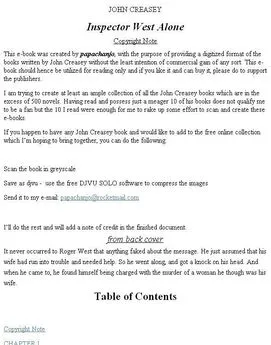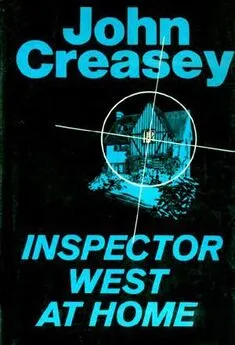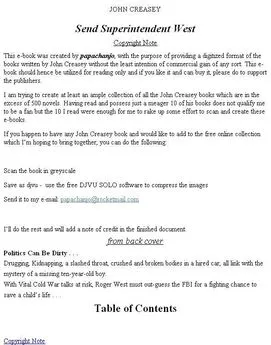John Creasey - Inspector West Alone
- Название:Inspector West Alone
- Автор:
- Жанр:
- Издательство:неизвестно
- Год:неизвестен
- ISBN:нет данных
- Рейтинг:
- Избранное:Добавить в избранное
-
Отзывы:
-
Ваша оценка:
John Creasey - Inspector West Alone краткое содержание
Inspector West Alone - читать онлайн бесплатно полную версию (весь текст целиком)
Интервал:
Закладка:
“What about the girl?”
Roger poured himself out another gin, refilled Sloan’s tankard, and hoped he was as casual as he ought to be. “I don’t follow? The girl I’ve just left——”
“No, not her. Marion Day.”
Sloan’s approach was puzzling. He was giving more away than a good policeman should. He had chosen to come on a Sunday night because it was the least likely time for a detective to call, and that was good tactics—but apart from that, he was being too clever.
Roger said slowly: “Marion Day ? No, it doesn’t ring a bell.”
Sloan laughed, spontaneously; there was nothing at all sinister about it.
“Ringing a bell is good.” He took a photograph from his pocket—of Marion. He thrust it forward under Roger’s nose. “Have a good look.”
Roger said : “I’ve seen her before, somewhere, but I don’t remember where, just now. I don’t know her well.”
“You will, if you ever join her,” said Sloan cryptically. “Either someone is storing up a lot of trouble for you, or you’re storing it up for yourself.” He came forward and looked hard into Roger’s eyes. “There was a telephone number with that alias of Kyle’s—Temple Bar 89511. Your office number. There was a telephone number in that girl’s handbag—T.B. 89511. Can you explain either?”
“Kyle, possibly because he’d been here, and might have wanted to try again. The girl——” Roger shook his head, but felt tension rising. “No, there’s no reason why she should have the number. There’s one thing you’ve probably overlooked.”
“What?”
“There are eleven people in my office. One of them might be involved—might be a friend of these people. I wouldn’t know.”
“I’ll find out,” said Sloan. “In fact I’m finding out, Rayner. These two people were killed by accident, if you believe the coroner, but I don’t always agree with inquest verdicts.” He finished his beer and took out cigarettes from a familiar yellow packet. Roger took one. “Remember the Copse Cottage murder?” Sloan asked, and his eyes were close to Roger’s above the flame of his lighter.
It wasn’t fair; the dice were loaded against Sloan. The slight pause, the nonchalance of manner, were preliminaries to a rapier thrust; strangers wouldn’t know, but Sloan had learned these very tricks from Roger.
“There are so many murders,” Roger said. “Copse Cottage—no. Well, vaguely. How long ago was it?”
Sloan said: “Say a couple of months.”
“Murderer still free?”
“Yes. A girl was battered to death. Her killer escaped, and that was quite a sensation, because he was kidnapped from the police, a gang was involved. You wouldn’t know anything about criminal gangs, would you?”
“Plenty. I read my newspapers.”
Sloan said harshly: “You’re just that much too clever. Ever used the name of Kennedy?”
“No.”
“Where did you get your money from to buy the business from Kennedy?” Sloan asked roughly.
Roger said: “I hypnotized him into letting me have it, and he didn’t have a chance. It wasn’t from anyone named Kennedy, anyhow, it was from Samuel Wiseman. I still don’t see where all this is getting, Mr. Policeman.”
Sloan shrugged and turned to pick up his tankard— danger flared again.
“This is just the preliminary stage, I’m making my man uneasy. What did you do before you bought this business?”
“I made a small fortune in Africa. People still can.”
That was in the records Kennedy had provided of his past.
“I’ll check that, too,” said Sloan. “When you were in Africa, or after you came back, did you ever have a visit from Chief Inspector West?”
CHAPTER XVII
CAUSE FOR ALARM
Roger had sensed a thrust coming and had his defences up. They weren’t strong enough to withstand that. He jerked his head up. Sloan grinned; Sloan had never seemed so sinister. Roger didn’t answer. Sloan moved towards him and put a hand on his shoulder and pressed hard; it was a familiar grip used when a policeman was going to charge a man, and enjoy doing it.
“So you did,” said Sloan.
Roger said: “No, I didn’t have a call from West.” He forced a laugh. “But that name startled me. I was reading an article about him in to-day’s Cry.” That was true enough, but was it a get out? Sloan looked disappointed, and took his hand away, but that didn’t mean that it was safe to breathe freely. “He disappeared, after—great Scott! The Copse Cottage murder!”
“Which you didn’t remember, although you read about it this afternoon.”
Roger said: “The article was about West, the murder was hardly mentioned. Another drink?”
“No, thanks. Sure you’ve never seen West?”
“He’s never called on me, you’re the first policeman I’ve met at close quarters.” Roger offered cigarettes, and Sloan took one and examined the tip thoughtfully. “I still don’t know what you’re getting at.”
Sloan said softly: “Roger West was a good friend of mine.”
“Was he?”
“That canard in the Cry isn’t worth the paper it’s written on. Oh, it doesn’t say anything openly, but it makes a pretty broad hint. West was a very good friend of mine. I think he was trapped and killed and his name smeared with muck, and I’ve just one job in my spare time—finding out the truth of that.”
“You’d better find the writer of that article.”
“I can find him whenever I want him,” said Sloan.
“Pity you can’t say the same about your friend.”
“Yes,” said Sloan heavily. “Listen to me, Rayner. I’ve spent a lot of time checking on your past and what you do. I haven’t found anything much against you. I’ll tell you something that I wouldn’t if I were here officially to-night. I like the cut of your jib. I don’t think you’re a bad ‘un, and I can smell bad ‘uns. You might be mixed up in something which you don’t know about. The man who owned this business wasn’t Wiseman, but a certain Mr. Kennedy. I think Kennedy can tell me something about
Roger said: “You get odd ideas, but I can’t speak for Kennedy. I dealt with Wiseman.”
“Please yourself,” said Sloan. He half-turned in preparation for another thrust. “Rayner, I’ve just come from West’s wife. She’s pathetic. She’s afraid that he’s dead, but she doesn’t know for certain. She’s frightened by things she can’t understand. She’s had a lot of that Cry muck poured into her, and it hurts her like hell. She knows what I know about West—there wasn’t a straighter man living. I’m going to scrape the mud off West’s name somehow. If you’re smeared with that mud, look out. If you’re not——”
Roger said: “I’m sorry for his wife.” He didn’t know how he got the words out, but Sloan didn’t seem to notice any oddness in the sound of his voice. Sloan might be foxing or, but more likely, had been carried away with his own emotions.
“All right,” Sloan said. “Tell your friend Kennedy what I’ve said.”
He went to the door. Roger let him out.
* * * *
Roger closed the door and went back to the sitting-room and saw nothing except the image of Janet’s face, superimposed on the memory of Sloan’s. His eyes stung, his hands were clammy. He sat down and leaned back in his chair and stared at the ceiling and at that image. It wasn’t a help to know that Sloan kept faith; nothing was a help.
Then he opened his eyes. The sight of sandwiches nauseated him. He poured himself out a strong whisky and soda.
It was a waste of time trying to guess how and why Sloan had so quickly connected Kyle, Marion, and Kennedy with him. He could see the build-up in Sloan’s mind; add to that Sloan’s tenacity, and in this case his burning desire to get at the truth, and it was all the explanation needed. By far the most important factor was the fact that Sloan had reason to suspect Kennedy.
Roger got up, took the money and the diamond out of the drawer and locked it in the small safe. Sloan had forced the pace. He himself had played cautiously for as long as he dared, and Kennedy was half-way to trusting him. He had never done a thing, since Kyle’s visit, to cause distrust. He was no longer followed everywhere, but in spite of that, he hadn’t put a foot wrong.
The first task was to find Kennedy’s home address.
As he was turning away, the telephone bell rang. It was Kennedy, who said:
“Well?”
“I must see you.” That rasping note should shake the man’s composure.
“I’ll come——”
“You won’t, you’re to keep away from here. Get that into your head. Where are you?”
“I’ll meet you——”
“Listen,” said Roger, “I’m not a stooge any longer, I’m a partner. We take the same risks, by relying on each other. I’m not going on with hole-in-corner business. Where are you?”
Kennedy said: “Percy will pick you up in half an hour’s time, outside the Burlington Arcade. He’ll bring you to me.”
* * * *
Roger went into the kitchen, tore some paper into squares, and, with steady hands, shook a little flour out of a tin into each square. Then he screwed the pieces of paper up; he had a dozen little screws when he’d finished. He wiped all trace of the flour away, and put the bags, wrapped in a large handkerchief, into his pocket.
* * * *
Percy was at the wheel of the Daimler, and didn’t get out. Roger climbed in. The car moved off swiftly, and the blinds fell, with the familiar whirring. Roger opened the side ventilation window, and waited until the car had turned two corners, then tossed one of the small screws of flour out. He waited for three more turns, and tossed another.
The journey took fifteen minutes, and he didn’t think they had gone farther than five minutes away from the Arcade; Percy had been driving over the same ground. As they slowed down, he dropped out another paper-bag.
Percy opened the door without letting up the blinds, Roger glanced up and down the dark street. Except that it was one of London’s squares, he couldn’t identify it. He glanced down at the pavement; the little white bag had burst ten yards or so away, the flour showed pale blue beneath a lamp.
He followed Percy to the house and saw that the number painted on a round pillar was twenty-seven. A manservant opened the door; so Kennedy lived in style. Percy came in and, without a word, took him upstairs. It was luxurious: carpets, tapestries on the walls, good furniture and soft lighting—the home you would expect of a millionaire. Percy led the way to a room on the right, tapped and opened it at a call.
It was a study; book-lined, with a magnificent carved-oak desk; a film set of a room falling just short of opulence. Kennedy stood by a white Adam mantelpiece, with a brandy glass in his hand and his eyes only slightly open. He tipped his head back to look at Roger.
“All right, Percy,” he said.
He was in a dinner-jacket. A cigar, half-smoked, lay on an ash-tray on the mantelpiece. On another, at the side of a chair, was a half-smoked cigarette; it was red-tipped, so a woman had been here to dinner.
The door closed with a click.
“What’s the cause for alarm, West?”
The slip. West instead of Rayner, betrayed Kennedy’s state of nerves. If Kennedy realized what he had done, he had the wit not to correct himself.
Roger said: “Why didn’t you tell me you were wanted by the police?”
Kennedy said softly: “But I’m not, and you know I’m not. You had a previous visit from Sloan, and he slung the name Kennedy into the conversation.”
“He’s after you,” Roger said abruptly. “What’s more he’s connected you with Kyle, Marion, and—with me. Don’t ask me how.”
Читать дальшеИнтервал:
Закладка:










